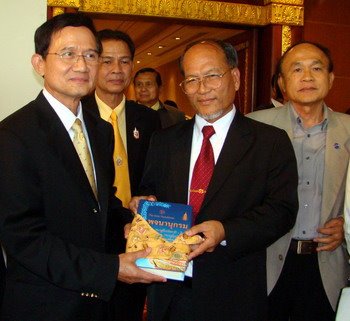Thailand's Ministry of Education has published a new Pattani Malay-Thai/Thai-Pattani Malay dictionary, in a limited run of 3,000 copies. Each book also comes with a CD. It will not be for sale, but will be distributed to schools, libraries, and government offices.
The lexicographers behind this new dictionary is a team of researchers from Prince of Songkhla University, Pattani Campus, headed by Worawit Baru. The team compiled the dictionary over the course of two years. It is reported to contain some 12,000 words, and weighs in at 596 pages. It also reportedly uses the Thai script to transcribe the Malay dialect, which I'm curious about. From my reading of news articles, they use Thai script exclusively and don't include the traditional orthography,
Jawi script.
Although
claimed by
some to be the first dictionary of Pattani Malay, in fact Prince of Songkhla University
previously published a Pattani Malay-Thai dictionary in 1984. It stands to reason that the new dictionary builds on the previous work.
The stated goal of this dictionary is to enable better communication between the Thai Buddhist national majority, and the local Thai Muslim majority in Thailand's troubled southern provinces.
Pattani is located on the Malay Peninsula, near the border of Malaysia. Pattani Malay, commonly referred to by Thais as Yawi (ยาวี, the Thai pronunciation of Jawi), is the majority language of this province, in which 88% of residents are Sunni Muslim.
Thai Education Minister, Somchai Wongsawat, left.
The other fellow, not identified anywhere in the
MOE publicity material, is presumably Worawit Baru.
Those interested in learning more about the Pattanai dialect Malay can read, for example,
this article about pronouns in Pattani Malay (in Thai, DOC format). Pattani Malay has previously been the subject of several Thai Master's and PhD theses (e.g. abstracts
here and
here), which cite the earlier Pattani Malay-Thai dictionary.



